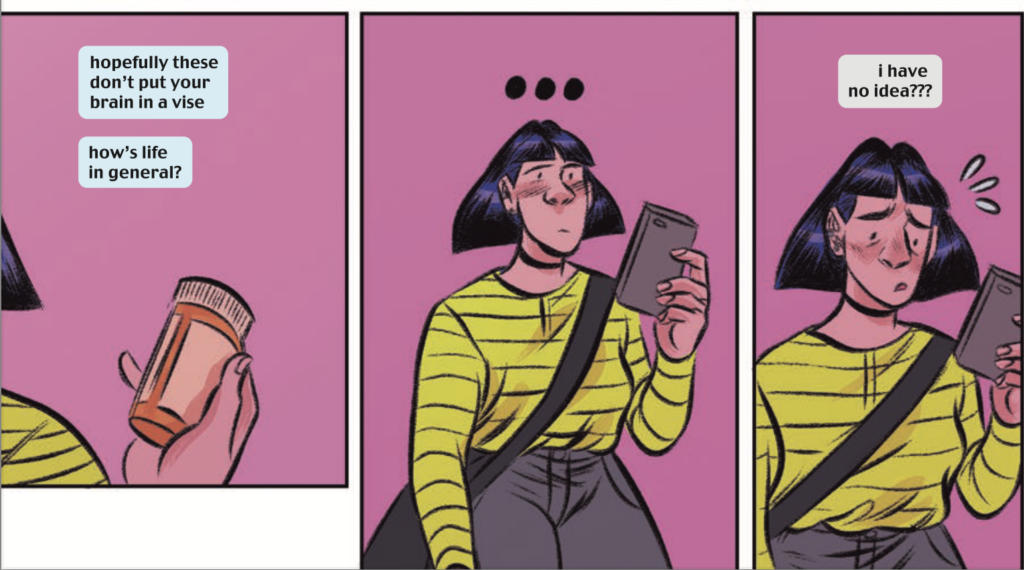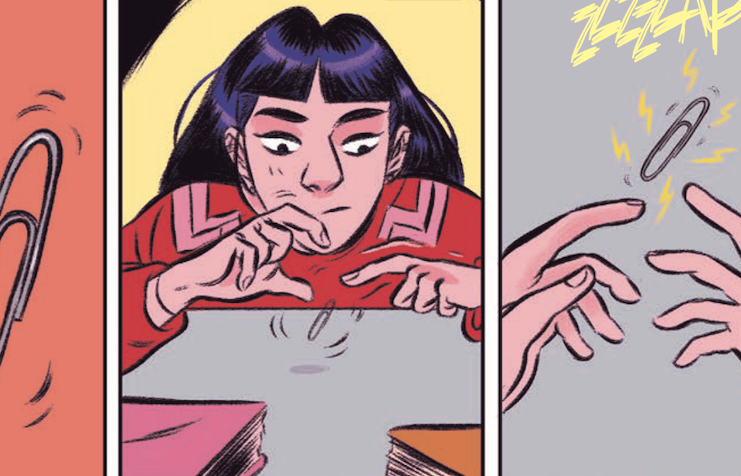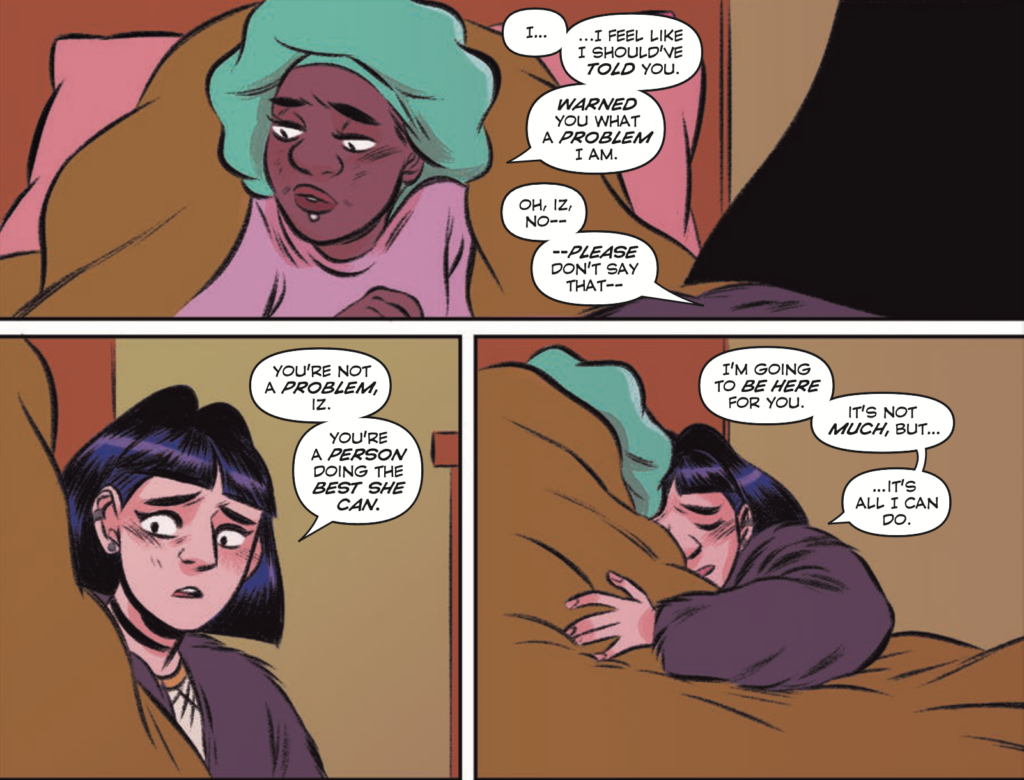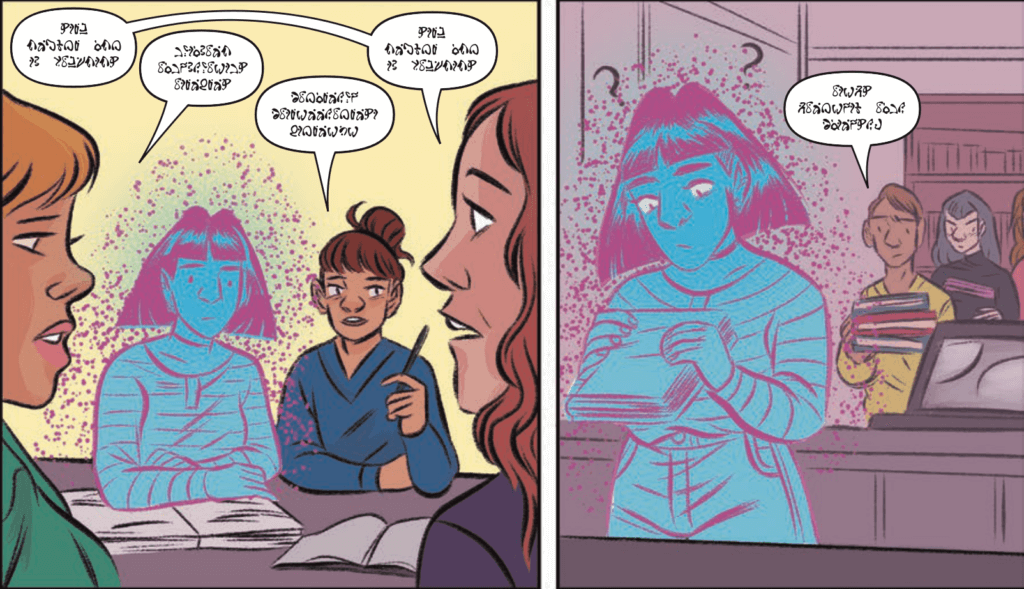Every superhero has an origin story. But most people will probably go their whole life without being bombarded by gamma rays or bitten by a mutant spider. What if superpowers could originate from something a little closer to home, like say, from our own health and the ways that we treat it? This is the question author Ted Anderson explores in his new graphic novel, Side Effects.
Side Effects
Ted Anderson (writer), Tara O’Connor (artist/colorist), Dave Sharpe (letterer)
Seismic Press, Aftershock Comics
October 18, 2022
Side Effects follows the story of Hannah, a newly minted college student whose depression and anxiety are causing her to struggle while navigating campus life and all it entails, like schoolwork, dating, and generally being independent for the first time. The main crux of the story deals with Hannah, under the guidance of the campus psychiatrist, trying out a variety of medications, attempting to find the right one that will help her cope with a minimum of side effects—a difficult process very familiar to anyone who has ever needed antidepressants. But instead of just normal side effects like headaches, weight gain, and sleep issues, Hannah finds herself grappling with side effects in the form of superpowers, like astral projection and mind reading. These superpowers are a great metaphor for the antidepressants themselves: they make her capable of interacting with the world and helping people in a way that she couldn’t before, but they also make her life difficult in new and imaginative ways.

Let me be clear: despite the fantasy superpower aspect, Side Effects is one of the most relatable graphic novels that I’ve ever read. Anderson described this book as “almost autobiographical,” but honestly… it felt almost biographical for me also. I also started antidepressants for the first time during college and I also struggled to absolute hell at the time with side effects, like brain fog and memory loss. This really drives home one of the major messages of the story—when you’re dealing with mental health issues, you’re not alone. In the book, Hannah realizes this when she sees that her new girlfriend, Iz, is also struggling with her bipolar disorder. Hannah isn’t alone and Iz isn’t alone and Ted Anderson isn’t alone and I’m not alone; this is something that so many people go through.
Consequently, this is a book that I wish I could have read when I was in college. I often like to joke that my ears always perk up when I hear someone start to talk about something their therapist told them, because, hey! Free therapy! That’s also how I felt while reading the exchanges between Hannah and her psychiatrist. Their discussions set realistic expectations for what it’s like starting on new medications: they’re not a cure-all and your anxiety will still always be there, but they can help you manage and cope with the regular difficulties of daily life. But they don’t inherently change anything about you either, which addresses a very common fear that I remember struggling with myself. I, too, had to try a whole bunch of different meds before I found one that worked for me—a process that took me years longer than it did for her, a process that I gave up for years out of frustration and then had to come back to later as an adult. If I had a more realistic expectation about how common it was for the process to look like that, would I have stuck it out and been able to get a handle on managing my anxiety years earlier? It’s certainly possible.
And all of this “free therapy” is contained in a book that’s as beautiful as it is moving. I love the tender way that artist Tara O’Connor depicts the characters, and particularly all the subtlety and nuance in their facial expressions. Side Effects is a story that takes place mainly inside Hannah’s mind, and I’m never left guessing about what she’s thinking, even when we’re not provided with her internal narrative. The first time Hannah meets Iz, we don’t need to be told that she had fallen head-over-heels in “crush” with her—the whole story was told by the stars in her eyes when she first saw her and the wobbly expression of nervousness on her face when she introduced herself. The colors are part of the story too, always setting the appropriate moods of excitement or dread, and always focusing our attention on the most important characters. (Hannah, and especially Iz, are often seen wearing bright colors like yellow, which really pop against the mostly purplish color palette.) Colors, too, give personality to Hannah’s various superpowers, like the ghostly neon blue and pink she takes on while astrally projecting, for instance.
But while the fantasy aspects of the story are fun and interesting, this is more a book about feelings than it is about superpowers. And here’s the big feelings takeaway I got: a reminder to treat yourself the way you’d treat other people. Watching Hannah go through what she was going through, it was so obvious from my perspective—the perspective of the reader—when she was being unnecessarily negative or harsh on herself. And (if you’ll let me get delightfully meta for a moment) when Hannah was watching Iz go through what she was going through, it was like holding up a mirror to the reader, letting Hannah get a taste of my perspective. She could see where Iz was going wrong, even though she couldn’t always see it in herself. Just like I could see where Hannah was going wrong, even though I can’t always see it in myself. Extending grace to others can be good practice for extending grace to yourself; sometimes it takes seeing things from a new perspective to realize that.
Of course not every comic has to have a lesson or a takeaway like this, but it can be really powerful when it does. I think Side Effects will be a powerful book for a significant subset of people, and it makes me happy and relieved to see more YA books dealing with these kinds of issues than there were when I was younger.




